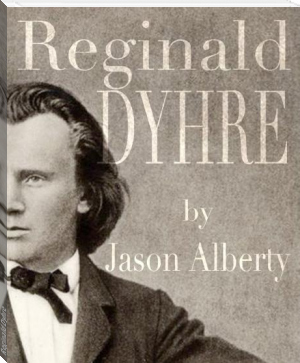Bliss - Katherine Mansfield (paper ebook reader TXT) 📗

- Author: Katherine Mansfield
- Performer: -
Book online «Bliss - Katherine Mansfield (paper ebook reader TXT) 📗». Author Katherine Mansfield
Her hat and jacket were off and hanging from the peg, and still George did not come. This was the first time he had ever not been there to hold the chair for her, to take her hat and hang up her bag, dangling it in his fingers as though it were something he’d never seen before—something fairy. And how quiet the shop was! There was not a sound even from Madame. Only the wind blew, shaking the old house; the wind hooted, and the portraits of Ladies of the Pompadour Period looked down and smiled, cunning and sly. Monica wished she hadn’t come. Oh, what a mistake to have come! Fatal. Fatal. Where was George? If he didn’t appear the next moment she would go away. She took off the white kimono. She didn’t want to look at herself any more. When she opened a big pot of cream on the glass shelf her fingers trembled. There was a tugging feeling at her heart as though her happiness—her marvellous happiness—were trying to get free.
“I’ll go. I’ll not stay.” She took down her hat. But just at that moment steps sounded, and, looking in the mirror, she saw George bowing in the doorway. How queerly he smiled! It was the mirror of course. She turned round quickly. His lips curled back in a sort of grin, and—wasn’t he unshaved?—he looked almost green in the face.
“Very sorry to have kept you waiting,” he mumbled, sliding, gliding forward.
Oh, no, she wasn’t going to stay. “I’m afraid,” she began. But he had lighted the gas and laid the tongs across, and was holding out the kimono.
“It’s a wind,” he said. Monica submitted. She smelled his fresh young fingers pinning the jacket under her chin. “Yes, there is a wind,” said she, sinking back into the chair. And silence fell. George took out the pins in his expert way. Her hair tumbled back, but he didn’t hold it as he usually did, as though to feel how fine and soft and heavy it was. He didn’t say it “was in a lovely condition.” He let it fall, and, taking a brush out of a drawer, he coughed faintly, cleared his throat, and said dully: “Yes, it’s a pretty strong one, I should say it was.”
She had no reply to make. The brush fell on her hair. Oh, oh, how mournful, how mournful! It fell quick and light, it fell like leaves; and then it fell heavy, tugging like the tugging at her heart. “That’s enough,” she cried, shaking herself free.
“Did I do it too much?” asked George. He crouched over the tongs. “I’m sorry.” There came the smell of burnt paper—the smell she loved—and he swung the hot tongs round in his hand, staring before him. “I shouldn’t be surprised if it rained.” He took up a piece of her hair, when—she couldn’t bear it any longer—she stopped him. She looked at him; she saw herself looking at him in the white kimono like a nun. “Is there something the matter here? Has something happened?” But George gave a half shrug and a grimace. “Oh, no, Madame. Just a little occurrence.” And he took up the piece of hair again. But, oh, she wasn’t deceived. That was it. Something awful had happened. The silence—really, the silence seemed to come drifting down like flakes of snow. She shivered. It was cold in the little cubicle, all cold and glittering. The nickel taps and jets and sprays looked somehow almost malignant. The wind rattled the window-frame; a piece of iron banged, and the young man went on changing the tongs, crouching over her. Oh, how terrifying Life was, thought Monica. How dreadful. It is the loneliness which is so appalling. We whirl along like leaves, and nobody knows—nobody cares where we fall, in what black river we float away. The tugging feeling seemed to rise into her throat. It ached, ached; she longed to cry. “That will do,” she whispered. “Give me the pins.” As he stood beside her, so submissive, so silent, she nearly dropped her arms and sobbed. She couldn’t bear any more. Like a wooden man the gay young George still slid, glided, handed her her hat and veil, took the note, and brought back the change. She stuffed it into her bag. Where was she going now? George took a brush. “There is a little powder on your coat,” he murmured. He brushed it away. And then suddenly he raised himself and, looking at Monica, gave a strange wave with the brush and said: “The truth is, Madame, since you are an old customer—my little daughter died this morning. A first child”—and then his white face crumpled like paper, and he turned his back on her and began brushing the cotton kimono. “Oh, oh,” Monica began to cry. She ran out of the shop into the taxi. The driver, looking furious, swung off the seat and slammed the door again. “Where to?” “Princes’,” she sobbed. And all the way there she saw nothing but a tiny wax doll with a feather of gold hair, lying meek, its tiny hands and feet crossed. And then just before she came to Princes’ she saw a flower shop full of white flowers. Oh, what a perfect thought. Lilies-of-the-valley, and white pansies, double white violets and white velvet ribbon…. From an unknown friend…. From one who understands…. For a Little Girl…. She tapped against the window, but the driver did not hear; and, anyway, they were at Princes’ already.
THE ESCAPE
IT was his fault, wholly and solely his fault, that they had missed the train. What if the idiotic hotel people had refused to produce the bill? Wasn’t that simply because he hadn’t impressed upon the waiter at lunch that they must have it by two o’clock? Any other man would have sat there and refused to move until they handed it over. But no! His exquisite belief in human nature had allowed him to get up and expect one of those idiots to bring it to their room…. And then, when the voiture did arrive, while they were still (Oh, Heavens!) waiting for change, why hadn’t he seen to the arrangement of the boxes so that they could, at least, have started the moment the money had come? Had he expected her to go outside, to stand under the awning in the heat, and point with her parasol? Very amusing picture of English domestic life. Even when the driver had been told how fast he had to drive he had paid no attention whatsoever—just smiled. “Oh,” she groaned, “if she’d been a driver she couldn’t have stopped smiling herself at the absurd, ridiculous way he was urged to hurry.” And she sat back and imitated his voice: “Allez, vite, vite “—and begged the driver’s pardon for troubling him….
And then the station—unforgettable—with the sight of the jaunty little train shuffling away and those hideous children waving from the windows. “Oh, why am I made to bear these things? Why am I exposed to them?…” The glare, the flies, while they waited, and he and the stationmaster put their heads together over the time-table, trying to find this other train, which, of course, they wouldn’t catch. The people who’d gathered round, and the woman who’d held up that baby with that awful, awful head…. “Oh, to care as I care—to feel as I feel, and never to be saved anything—never to know for one moment what it was to … to … “
Her voice had changed. It was shaking now—crying now. She fumbled with her bag, and produced from its little maw a scented handkerchief. She put up her veil and, as though she were doing it for somebody else, pitifully, as though she were saying to somebody else: “I know, my darling,” she pressed the handkerchief to her eyes.
The little bag, with its shiny, silvery jaws open, lay on her lap. He could see her powder-puff, her rouge stick, a bundle of letters, a phial of tiny black pills like seeds, a broken cigarette, a mirror, white ivory tablets with lists on them that had been heavily scored through. He thought: “In Egypt she would be buried with those things.”
They had left the last of the houses, those small straggling houses with bits of broken pot flung among the flower-beds and half-naked hens scratching round the doorsteps. Now they were mounting a long steep road that wound round the hill and over into the next bay. The horses stumbled, pulling hard. Every five minutes, every two minutes the driver trailed the whip across them. His stout back was solid as wood; there were boils on his reddish neck, and he wore a new, a shining new straw hat….
There was a little wind, just enough wind to blow to satin the new leaves on the fruit trees, to stroke the fine grass, to turn to silver the smoky olives—just enough wind to start in front of the carriage a whirling, twirling snatch of dust that settled on their clothes like the finest ash. When she took out her powder-puff the powder came flying over them both.
“Oh, the dust,” she breathed, “the disgusting, revolting dust.” And she put down her veil and lay back as if overcome.
“Why don’t you put up your parasol?” he suggested. It was on the front seat, and he leaned forward to hand it to her. At that she suddenly sat upright and blazed again.
“Please leave my parasol alone! I don’t want my parasol! And anyone who was not utterly insensitive would know that I’m far, far too exhausted to hold up a parasol. And with a wind like this tugging at it…. Put it down at once,” she flashed, and then snatched the parasol from him, tossed it into the crumpled hood behind, and subsided, panting.
Another bend of the road, and down the hill there came a troop of little children, shrieking and giggling, little girls with sun-bleached hair, little boys in faded soldiers’ caps. In their hands they carried flowers—any kind of flowers—grabbed by the head, and these they offered, running beside the carriage. Lilac, faded lilac, greeny-white snowballs, one arum lily, a handful of hyacinths. They thrust the flowers and their impish faces into the carriage; one even threw into her lap a bunch of marigolds. Poor little mice! He had his hand in his trouser pocket before her. “For Heaven’s sake don’t give them anything. Oh, how typical of you! Horrid little monkeys! Now they’ll follow us all the way. Don’t encourage them; you would encourage beggars”; and she hurled the bunch out of the carriage with “Well, do it when I’m not there, please.”
He saw the queer shock on the children’s faces. They stopped running, lagged behind, and then they began to shout something, and went on shouting until the carriage had rounded yet another bend.
“Oh, how many more are there before the top of the hill is reached? The horses haven’t trotted once. Surely it isn’t necessary for them to walk the whole way.”
“We shall be there in a minute now,” he said, and took out his cigarette-case. At that she turned round towards him. She clasped her hands and held them against her breast; her dark eyes looked immense, imploring, behind her veil; her nostrils quivered, she bit her lip, and her head shook with a little nervous spasm. But when she spoke, her voice was





Comments (0)